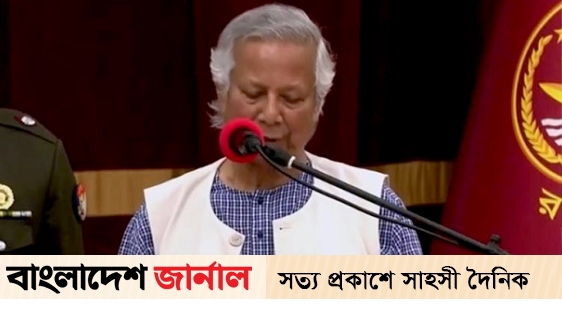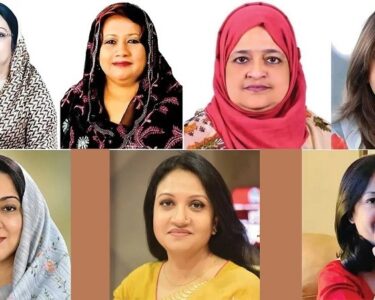15 consecutive years of Awami rule came to an end in the mass uprising of the students. After the fall of the Awami League government on August 8, he took oath as the head of the interim government. Muhammad Yunus. After that, the advisory council of the interim government was formed under his leadership. Today is one month since the new government took over.
The new government is reforming various sectors starting from the current law and order system. The interim government has emphasized on reforming the state and restructuring the economy. However, analysts believe that the law and order situation is not yet fully under control. They urge to make visible the reforms of the state as promised. Besides, experts believe that the election roadmap is also important for peaceful transfer of power.
Former Prime Minister Sheikh Hasina was forced to resign and flee to India on August 5 in a bloody uprising by students. The ministers and MPs of the Awami League government went into hiding. Many have been arrested again. Party leaders and high-ranking bureaucrats close to the government are also covered. The angry crowd attacked and vandalized and looted the important buildings of the country, including the Government House, the Parliament House, the Prime Minister's Office. Thousands of freedom-seeking people including children, teenagers, students and women lost their lives due to the brutal repression of the authoritarian Hasina government. The agitators referred to this victory of the people in Bangladesh as the second freedom achieved through the bloody liberation war.
It is known that after the end of the autocracy, there is great hope and enthusiasm among the people regarding the formation of a democratic Bangladesh without discrimination by reforming the state and reorganizing the economy. The country's institutions are on the verge of destruction due to the long autocracy, law and order and judicial system have collapsed, the economy is also in turmoil due to the looting of political patronage. Those areas have been strengthened to reform. Changes are being made in all the officials appointed by the dictator, administrators and judiciary. Initiatives are being taken to reorganize every institution.
On August 8, the chief adviser took the oath. 14 advisers including Muhammad Yunus. The cabinet department issued a notification allotting the offices of the chief adviser and other advisers on Friday. Later on August 11 adviser Supradeep Chakma and Bidhan Ranjan Roy took oath and on August 13 another adviser Farooq-e-Azam took oath. Four more advisers were sworn in on August 16 afternoon. President Md. Sahabuddin recited their oath. At present there are 21 members of the Advisory Council including the Chief Advisor.
Yunus government has given importance to several issues since the formation of the interim government. These include inviting the UN Human Rights Office to conduct an independent and impartial UN-led investigation into the July and August killings; Initiatives to create a comprehensive list of martyrs and wounded, as well as a foundation for long-term treatment of the wounded and care of the families of the martyrs; Restructuring the Board of Directors, freeing the banks from the control of big debtors and predatory business groups; A list of 150 influential persons accused of corruption and money laundering has been prepared and investigations have been started against 79 persons; Abolition of the provision of laundering undisclosed assets i.e. black money by paying income tax at the rate of 15 percent; Promulgation of suspension of all ongoing operations under the Rapid Enhancement of Supply of Electricity and Energy (Special Provisions) Act, 2010 (Amended 2021), known as the Exemption Act; Decision not to increase electricity and gas prices by executive order without public hearing; Decision to re-examine projects taken for political purposes or projects in the process of going to the Executive Committee of the National Economic Council (ECNEC).
In addition, sign the International Convention for the Protection of All Persons from Enforced Disappearance and form a commission to investigate organized disappearances during the previous government; Formation of a white paper drafting committee to highlight the overall economic situation of the country; Formation of a National Committee to review contracts executed under the Rapid Increase in Supply of Electricity and Energy (Special Provisions) Act, 2010 (Amended 2021) during the Awami League Government; Formation of an expert committee on thematic reform of the health system, quality improvement of medical services, strengthening of the structure of the health system; To provide an environment for the press to function independently and to call upon the media to be vocal in pointing out errors in the governance of the government by the Chief Adviser; Metrorail launched at the earliest, decision to keep Metrorail operational on Friday; Strong protest has been expressed to India over the killing of Bangladeshi teenager Swarna Das by the Indian Border Security Force (BSF) at the Kulaura border in Moulvibazar and the long pending Teesta River water sharing agreement has been urged to negotiate with India regarding the water sharing of transboundary rivers between Bangladesh and India according to international law.
Representatives of all other political parties except Awami League and the 14-party alliance met with Chief Advisor Muhammad Yunus. Top leaders of various political parties including BNP, Jamaat-e-Islami met there. The representatives of the parties presented their various proposals on reforms in politics and elections in the meeting. The overall situation of the country, reforms and upcoming national elections are also being discussed with the political parties. Besides, Chief Advisor Muhammad Yunus also held a meeting with the editorial board.
Political scientist Dilara Chowdhury said, the government has given us relief. However, law and order has not yet been fully established. The police could not be organized yet. Those who do not come should be fired. The unemployed should be given space in that place.
He said, we should return to political parties for democracy. Unlimited time cannot be given to do this. The government should give a roadmap, this will be done, within this period. Maybe it won't be in time. It can be either way but a roadmap should be given.
Dilara also said that there are many people in the government who were involved in One Eleven. Those who helped bring Sheikh Hasina to power and helped keep her in power. This created fear among the people.
Another political scientist Al Masud Hasanuzzaman said, the stagnation in administration and education has decreased. The government has international acceptance and is pursuing an independent foreign policy. This is the positive side of the government. Not only the government but also the stakeholders political parties should conduct dialogue. Civil society and students should move forward together. However, it is difficult. It is difficult to determine the roadmap and how long the government will last. Since reform is a long process. However, it must be started.
Bangladesh /FM
👇Follow more 👇
👉 bdphone.com
👉 ultraactivation.com
👉 trainingreferral.com
👉 shaplafood.com
👉 bangladeshi.help
👉 www.forexdhaka.com
👉 uncommunication.com
👉 ultra-sim.com
👉 forexdhaka.com
👉 ultrafxfund.com
👉 ultractivation.com
👉 bdphoneonline.com



